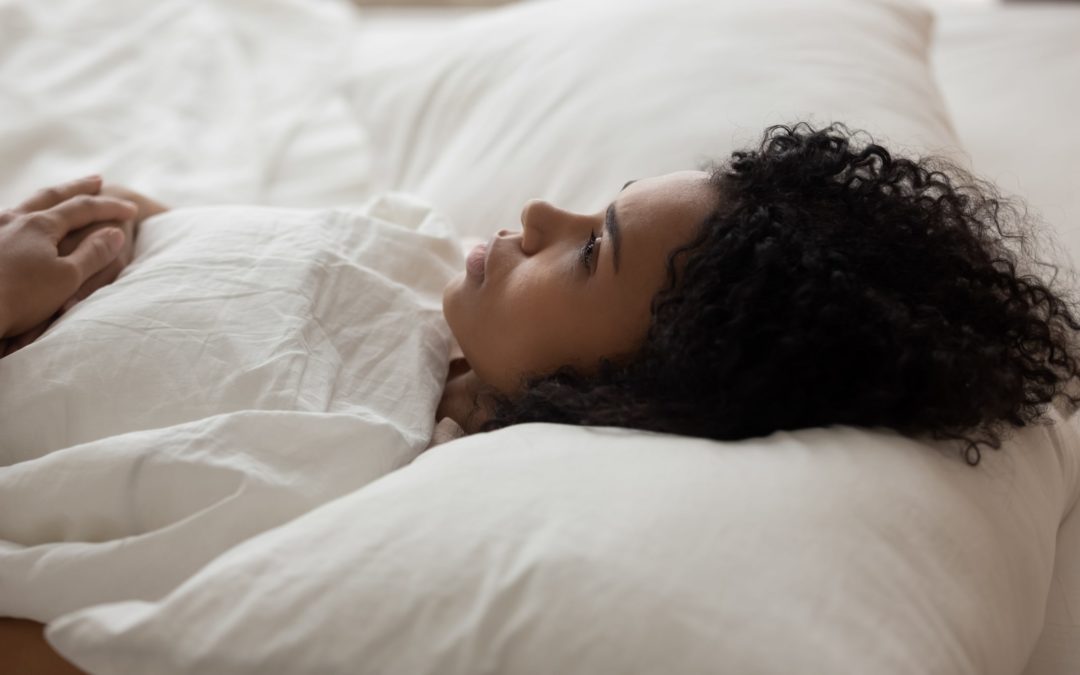Image sourced by Fizkes / iStock
By Sarah Regan / May 2, 2021
Setting and sticking to a consistent sleep schedule is so important for both regulating your circadian rhythm and supporting your overall sleep quality. But let’s be honest: We could all use a morning of sleeping in to catch up on lost zzz’s from time to time. However, for some people, sleeping in is easier said than done.
As doctor of chiropractic and functional medicine expert Stacie Stephenson, D.C., CNS, tells mbg, “If you need to sleep in the morning, due to an evening work schedule or just because you know you need more sleep, you will be fighting some very natural biological cues urging you to wake up.”
Here are a handful of things that can keep you from sleeping in, according to Stephenson, plus her tips on what to do about them if you’re in the market for a little extra snooze:
1. Light
As we know, melatonin production in the evening is what helps signal the body that it’s time for bed. But when the sun comes up, Stephenson explains to mbg, “the pineal gland, exposed to light through the eyes, gets the signal to turn off melatonin production.” Sunlight also triggers serotonin production, she adds, which helps us wake up and feel good in the morning.
What to do about it:
If you can’t stay asleep once the sun comes up, Stephenson recommends investing in some blackout curtains and/or a sleep mask, to trick your brain into thinking it’s still nighttime. Of course, you don’t need to use them all the time, but if you know you’ll want to sleep in, you can draw your curtains or put on your sleep mask the night before.
2. Cortisol
Cortisol, aka the stress hormone, gets excreted in the morning to help people wake up, Stephenson explains. And you’ll actually continue to get bursts of it throughout the morning, to help you transition from sleep to waking.
What to do about it:
Stephenson recommends combating cortisol with carbs. “If you wake up and can’t get back to sleep in the morning, have a small carb-rich snack,” she says. “Studies show low blood sugar can cause cortisol spikes, and that may influence morning waking since you haven’t eaten all night.”
3. Low blood sugar
Speaking of cortisol spikes, your blood sugar could definitely be at play. “You haven’t eaten all night, and low blood sugar can lead to a rise in cortisol, which could wake you up,” Stephenson notes. This is actually why it’s not a bad idea to have a healthy bedtime snack from time to time—because cortisol spikes can happen in the middle of the night, too.
What to do about it:
Again, in this case you want to go for a snack that can help balance your blood sugar. “Have a small glass of juice or a piece of fruit (or applesauce), or a few spoonfuls of yogurt, then try going back to sleep,” she suggests.
4. Noise
Whether you live on a noisy block or you’re just a particularly light sleeper, what’s worse than morning commotion disturbing your slumber? Noise can significantly impair the ability to sleep, Stephenson says, adding that “even if you think noise doesn’t keep you awake, it may be interfering with your sleep quality.”
What to do about it:
While there’s, unfortunately, not much that can be done to control noise outside, there are some strategies to help mitigate noise in your home and specifically in your bedroom.
Of course, turn off anything before bed that might make noise, like the TV or your computer, Stephenson recommends. She adds noise-canceling ear protection can also be helpful, and if you live with family or roommates, it might be worth asking them to honor your efforts to sleep in by being quiet in the a.m.
5. Mental chatter
We’ve all had those anxious mornings when our minds seem to be racing before we even open our eyes—and that’s not conducive to dozing back into dreamland. “Once your brain starts going, it can be hard to turn it off,” Stephenson tells mbg, “but letting go of worry and anxious thoughts is the best way to get back to sleep.”
What to do about it:
If mental chatter is keeping you up, Stephenson recommends some relaxing options you can do without even getting up, like writing down anything you’re worrying about to get it out of your head.
She also suggests trying meditating or deep breathing, noting that both can help reverse the body’s wake-up mode response. “No need to sit up,” she adds. “Just focus on breathing slowly and deeply, in and out, or focus on a calming word and repeat it in your mind until you drift off again.”
Stephenson adds that one of the most important rules of sleeping in is to be patient. “Sometimes your body just needs to know you aren’t getting up,” she says. “Relax, keep your eyes closed, and stop worrying about falling asleep.” Sometimes the worry and frustration about not being able to fall asleep are exactly what’s keeping you up! “If you let go of that thought process that ‘Oh no if I don’t get enough sleep my day will be ruined,’ you may be able to relax enough to fall asleep and get in a few more good solid hours,” she says.
The bottom line.
Even the most strict of sleep-wake schedules can be broken once in a while. Any of these methods may help if you’re the kind of person who can’t sleep in for the life of them. Because, yes, while it is important for your sleep schedule to be consistent a majority of the time, it’s also important to honor your body’s needs on any given day and recognize when you need to hit snooze.


